
MERCIER PRESS
3B Oak House, Bessboro Rd
Blackrock, Cork, Ireland.
 www.mercierpress.ie
www.mercierpress.ie
 www.twitter.com/MercierBooks
www.twitter.com/MercierBooks
 www.facebook.com/mercier.press
www.facebook.com/mercier.press
Cover design by Sarah OFlaherty
David Burke, 2021
Epub ISBN: 978 1 78117 801 0
This eBook is copyright material and must not be copied, reproduced, transferred, distributed, leased, licensed or publicly performed or used in any way except as specifically permitted in writing by the publishers, as allowed under the terms and conditions under which it was purchased or as strictly permitted by applicable copyright law. Any unauthorised distribution or use of this text may be a direct infringement of the authors and publishers rights and those responsible may be liable in law accordingly.
Printed and bound in the EU.
Dramatis Personae
BAKER, Albert: a soldier in the Royal Irish Rangers who deserted while in Belfast in 1972 and joined the UDA. He became a British military intelligence asset.
CARVER , Lord Michael: Chief of the General Staff (CGS) of the British army on Bloody Sunday. He worked with Frank Kitson in Kenya and Cyprus.
C HICHESTER-CLARK , James: prime minister of Northern Ireland, 19691971.
D UNNET , Sir James: Permanent Under-secretary at the Ministry of Defence, 19661974.
EASTWOOD , David: MI5 officer who was Director of Intelli- gence Northern Ireland on Bloody Sunday.
FARRAR-HOCKLEY , Maj.-Gen. Anthony: Commander Land Forces (CLF) Northern Ireland August 1970August 1971. The CLF was the second most senior rank in Northern Ireland in the early 1970s. Gen. Robert Ford succeeded him.
FAULKNER , Brian: prime minister of Northern Ireland, 19711972.
FORD , Gen. Robert: Commander Land Forces in Northern Ireland on Bloody Sunday. A former paratrooper with counter-insurgency experience in Palestine and Aden, he succeeded Farrar-Hockley as internment was introduced.
HEATH , Edward: Conservative party prime minister of the UK, 197074.
HERRON, Tommy: Vice-chairman of the UDA who ran that organisations assassination programme. He had a relationship with British military intelligence through an officer who went by the nom de guerre Capt. Bunty.
JACKSON , Michael: a captain in 1 Para and adjutant to its commander Lt Col Wilford in 19712. He later rose to become Chief of the General Staff of the British army.
KITSON , Frank: British army counter-insurgency expert who served in Malaya, Kenya, Cyprus, Oman and Northern Ireland. He was the brigadier in charge of the 39 Brigade area which included Belfast, 197072.
LAGAN , Frank: Chief Superintendent with the RUC in Derry on Bloody Sunday.
LEWIS, Byron: radio operator with the Support Company of 1 Para on Bloody Sunday. His testimony was crucial in forcing the British government to set up a new tribunal which became known as the Saville Inquiry. He revealed that he saw his colleagues fire at unarmed civilians in Derry on Bloody Sunday.
LODEN , Edward Charles: the major who commanded 1 Paras Support Company on Bloody Sunday.
MacLELLAN , Patrick: brigadier of 8 Brigade which oversaw military operations in Derry. He later rose to the rank of general.
McMULLEN , Peter: corporal with 1 Para based at Palace Barracks who deserted the British army and joined the Provisional IRA.
MOONEY , Hugh: Foreign Office official who worked for the Information Research Department (IRD), a propaganda organisation attached to the Foreign Office.
OBSERVER B : an agent of both British military intelligence and MI5 who had access to the no-go area of Derry in 1972.
SAVILLE , Lord Mark: chairman of the Saville Tribunal into Bloody Sunday. While he vindicated the reputation of the victims vilified by Lord Widgery in his report on Bloody Sunday, he offered no plausible explanation for the behaviour of the paratroopers who perpetrated the massacre.
SMITH , Howard: Foreign Office official appointed by Edward Heath as the UK Representative (UKREP) to the Stormont government of Northern Ireland. He later became the director-general of MI5, 19781981.
TUGWELL , Col Maurice: British army officer who ran psycho- logical operations in Northern Ireland.
TUZO , Maj.-Gen. Harold: General Officer Commanding Northern Ireland (GOC, NI) on Bloody Sunday.
WIDGERY , John Passmore: Lord Chief Justice of England and Wales, 19701980. He chaired the Widgery tribunal into Bloody Sunday in 1972. He vilified the murdered civilians on Bloody Sunday in his report into the atrocity.
WILFORD , Lt Col Derek: Commander of 1 Para, 19712.
Organisations, terms, locations and acronyms
8 Brigade: British troops stationed in Derry and its environs were assigned to 8 Brigade. Its HQ was located at Ebrington Barracks in Derry.
39 Brigade: British troops stationed in Belfast and the eastern side of Northern Ireland (excluding the South Armagh border region) made up 39 Brigade. Its HQ was located at Thiepval Barracks, Lisburn, on the outskirts of Belfast.
APC: armoured personnel carrier such as a Saracen, sometimes referred to as a pig.
Ballymurphy : a predominantly Catholic/Nationalist area of Bel- fast. The Ballymurphy massacre took place here in August of 1971.
BIS: British Information Service.
B-Specials: members of the Ulster Special Constabulary, a part-time force disbanded in 1970.
Bogside: an estate below the Derry Walls. It is predominantly Nationalist/Catholic. The name derives from the fact it was built on an area of peat bog.
CDCs: Citizen Defence Committees.
CLF: Commander of Land Forces, the second most senior rank in the British army in Northern Ireland in the early 1970s.
CO: Commanding officer.
Creggan: a predominantly Nationalist/Catholic housing estate in Derry built on a hillside above the Bogside.
DYH: Derry Young Hooligans.
Ebrington Barrack: the HQ of 8 Brigade in Derry.
Fianna Fil: the Irish political party in power in the Republic of Ireland during the Kitson era. Led by Taoiseach Jack Lynch.
Fine Gael: the Irish political party in the Republic of Ireland which led the opposition during the Kitson era.
Fort George: British army base located on the banks of the River Foyle on the northern outskirts of Derry adjacent to the Strand Road.
FCO: Foreign and Commonwealth Office.
Free Derry: first no-go area in Northern Ireland.
Garda Sochna: the police force of the Republic of Ireland.
Glenfada Park: a small estate of low-rise flats adjacent to the Rossville flat complex in Derry.
HQNI: Headquarters NI, based in Thiepval Barracks in Lisburn.
HMG: Her Majestys Government.
Internment: imprisonment without trial.
IRD: Information Research Department: it was part of the Foreign Office. It ran propaganda campaigns for the British government.
JSIW: The Joint Service Interrogation Wing of the British army which trained RUC Special Branch officers in interrogation techniques in April 1971.
Kitsons Private Army: see the entry regarding Support Com- pany below.
Knights of Malta: a voluntary paramedic organisation.
Low-intensity operations: a low intensity operation is any military operation other than those in a conventional, high-intensity war. They may include counter-insurgency, counter- guerrilla warfare, counter-terrorism, unconventional warfare, intelligence, peacekeeping, peace enforcement, security force assistance, nation-building, civil affairs, and information operations.


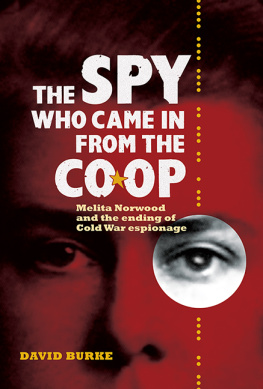
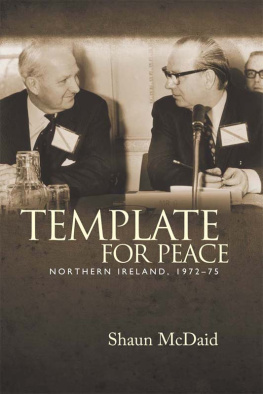
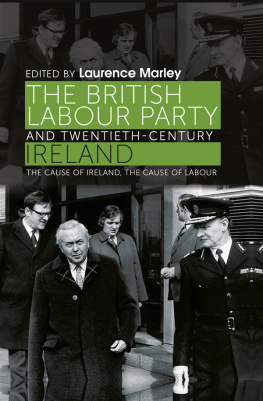

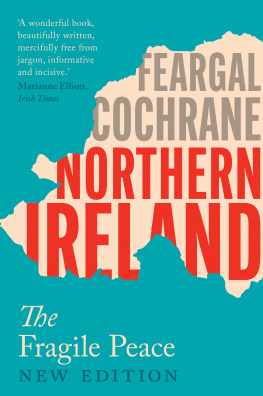
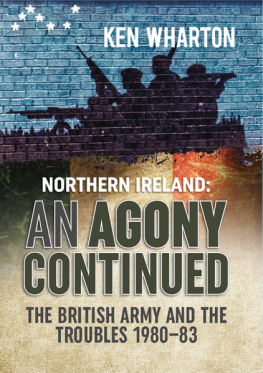
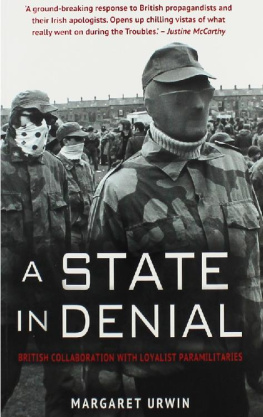
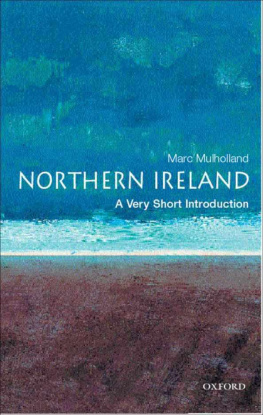
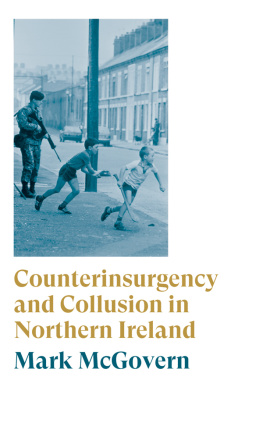
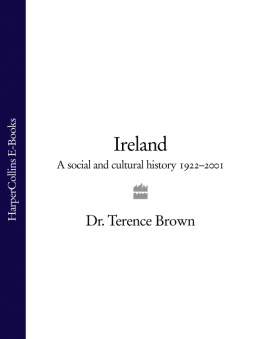
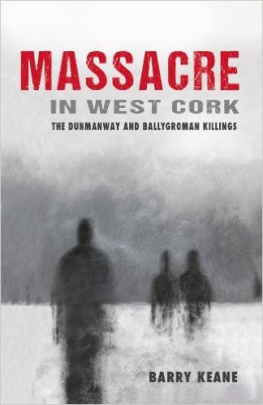
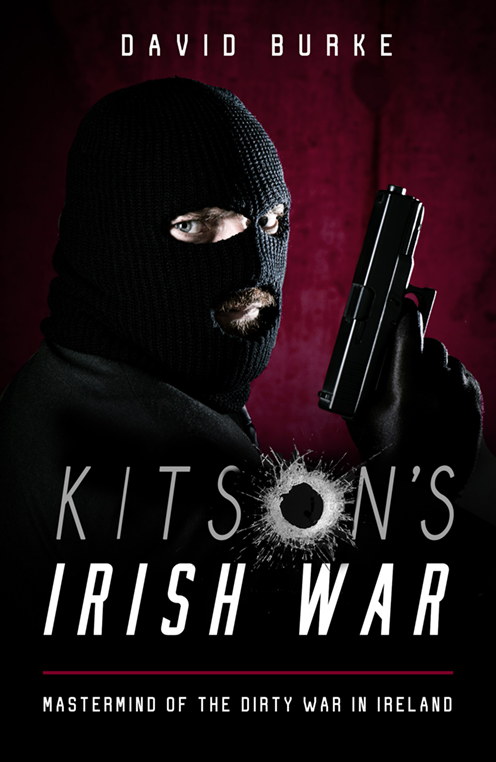

 www.mercierpress.ie
www.mercierpress.ie www.twitter.com/MercierBooks
www.twitter.com/MercierBooks www.facebook.com/mercier.press
www.facebook.com/mercier.press